每年农历的正月十五日
元宵节的来历和习俗介绍

元宵节的来历和习俗介绍农历正月十五元宵节,又称为“上元节”,春灯节,是中国汉族民俗传统节日。
正月是农历的元月,古人称其为“宵”,而十五日又是一年中第一个月圆之夜,所以称正月十五为元宵节。
又称为小正月、元夕或灯节,是春节之后的第一个重要节日。
中国幅员辽阔,历史悠久,所以关于元宵节的习俗在全国各地也不尽相同,其中吃元宵、赏花灯、舞龙、舞狮子等是元宵节几项重要民间习俗。
每年农历的正月十五日,春节刚过,迎来的就是中国汉族的传统节日之一的元宵节,正月是农历的元月,古人称夜为“宵”,所以称正月十五为元宵节。
正月十五日是一年中第一个月圆之夜,也是一元复始,大地回春的夜晚,人们对此加以庆祝,也是庆贺新春的延续。
元宵节又被称为“上元节”。
按中国民间的传统,在这天上皓月高悬的夜晚,人们要点起彩灯万盏,以示庆贺。
出门赏月、燃灯放焰、喜猜灯谜、共吃元宵,合家团聚、同庆佳节,其乐融融。
上元,含有新的一年第一次月圆之夜的意思。
上元节的由来,《岁时杂记》记载说,这是因循道教的陈规。
道教曾把一年中的正月十五称为上元节,七月十五为中元节,十月十五为下元节,合称“三元”。
汉末道教的重要派别五斗米道崇奉的神为天官、地官、水官,说天官赐福,地官赦罪,水官解厄,并以三元配三官,说上元天官正月十五日生,中元地官七月十五日生,下元水官十月十五日生。
这样,正月十五日就被称为上元节。
南宋吴自牧在《梦粱录》中说:“正月十五日元夕节,乃上元天官赐福之辰。
”说天官赐福,地官赦罪,而元宵节俗真正的动力是因为它处在新的时间点上,人们充分利用这一特殊的时间阶段来表达自己的生活愿望。
起源元宵节是中国的传统节日,早在2000多年前的西汉就有了,元宵赏灯始于东汉明帝时期,明帝提倡佛教,听说佛教有正月十五日僧人观佛舍利,点灯敬佛的做法,就命令这一天夜晚在皇宫和寺庙里点灯敬佛,令士族庶民都挂灯。
以后这种佛教礼仪节日逐渐形成民间盛大的节日。
该节经历了由宫廷到民间,由中原到全国的发展过程。
农历正月十五是什么节日-
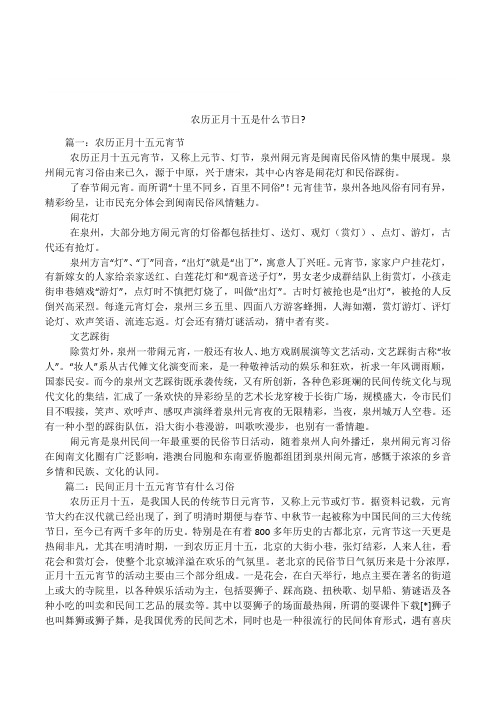
农历正月十五是什么节日? 篇一:农历正月十五元宵节 农历正月十五元宵节,又称上元节、灯节,泉州闹元宵是闽南民俗风情的集中展现。
泉 州闹元宵习俗由来已久,源于中原,兴于唐宋,其中心内容是闹花灯和民俗踩街。
了春节闹元宵。
而所谓“十里不同乡,百里不同俗”!元宵佳节,泉州各地风俗有同有异, 精彩纷呈,让市民充分体会到闽南民俗风情魅力。
闹花灯 在泉州,大部分地方闹元宵的灯俗都包括挂灯、送灯、观灯(赏灯)、点灯、游灯,古 代还有抢灯。
泉州方言“灯”、 “丁”同音, “出灯”就是“出丁”, 寓意人丁兴旺。
元宵节, 家家户户挂花灯, 有新嫁女的人家给亲家送红、白莲花灯和“观音送子灯”,男女老少成群结队上街赏灯,小孩走 街串巷嬉戏“游灯”,点灯时不慎把灯烧了,叫做“出灯”。
古时灯被抢也是“出灯”,被抢的人反 倒兴高采烈。
每逢元宵灯会,泉州三乡五里、四面八方游客蜂拥,人海如潮,赏灯游灯、评灯 论灯、欢声笑语、流连忘返。
灯会还有猜灯谜活动,猜中者有奖。
文艺踩街 除赏灯外, 泉州一带闹元宵, 一般还有妆人、 地方戏剧展演等文艺活动, 文艺踩街古称“妆 人”。
“妆人”系从古代傩文化演变而来,是一种敬神活动的娱乐和狂欢,祈求一年风调雨顺, 国泰民安。
而今的泉州文艺踩街既承袭传统,又有所创新,各种色彩斑斓的民间传统文化与现 代文化的集结,汇成了一条欢快的异彩纷呈的艺术长龙穿梭于长街广场,规模盛大,令市民们 目不暇接,笑声、欢呼声、感叹声演绎着泉州元宵夜的无限精彩,当夜,泉州城万人空巷。
还 有一种小型的踩街队伍,沿大街小巷漫游,叫歌吹漫步,也别有一番情趣。
闹元宵是泉州民间一年最重要的民俗节日活动,随着泉州人向外播迁,泉州闹元宵习俗 在闽南文化圈有广泛影响,港澳台同胞和东南亚侨胞都组团到泉州闹元宵,感慨于浓浓的乡音 乡情和民族、文化的认同。
篇二:民间正月十五元宵节有什么习俗 农历正月十五,是我国人民的传统节日元宵节,又称上元节或灯节。
元宵节的传统习俗与意义
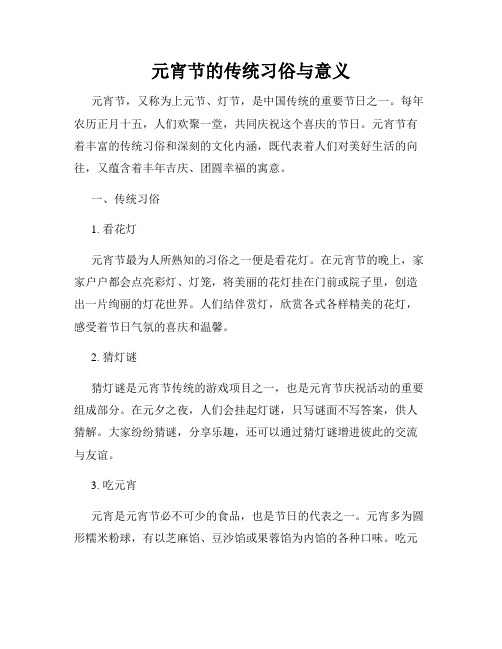
元宵节的传统习俗与意义元宵节,又称为上元节、灯节,是中国传统的重要节日之一。
每年农历正月十五,人们欢聚一堂,共同庆祝这个喜庆的节日。
元宵节有着丰富的传统习俗和深刻的文化内涵,既代表着人们对美好生活的向往,又蕴含着丰年吉庆、团圆幸福的寓意。
一、传统习俗1. 看花灯元宵节最为人所熟知的习俗之一便是看花灯。
在元宵节的晚上,家家户户都会点亮彩灯、灯笼,将美丽的花灯挂在门前或院子里,创造出一片绚丽的灯花世界。
人们结伴赏灯,欣赏各式各样精美的花灯,感受着节日气氛的喜庆和温馨。
2. 猜灯谜猜灯谜是元宵节传统的游戏项目之一,也是元宵节庆祝活动的重要组成部分。
在元夕之夜,人们会挂起灯谜,只写谜面不写答案,供人猜解。
大家纷纷猜谜,分享乐趣,还可以通过猜灯谜增进彼此的交流与友谊。
3. 吃元宵元宵是元宵节必不可少的食品,也是节日的代表之一。
元宵多为圆形糯米粉球,有以芝麻馅、豆沙馅或果蓉馅为内馅的各种口味。
吃元宵寓意着团圆、和谐,意味着新的一年里家庭团聚、事业顺利、幸福美满。
此外,元宵还象征着人们对美好未来的憧憬和对灾难的驱逐。
4. 舞龙灯舞龙灯是南方地区特有的元宵节表演形式。
人们将寓意着吉祥、祥瑞的龙灯舞动起来,穿梭于人群之间,带动着欢乐和喜庆的气氛。
舞龙灯不仅给人们带来了视觉上的享受,更传递着对新年的美好祝福。
二、意义与寓意1. 团圆与家庭的重要性元宵节作为春节的收官之日,体现了中国人对团聚、家庭和睦的价值观念。
在这一天,人们回家与亲人共进晚餐,分享喜悦和幸福。
无论身处何地,元宵节都成为了人们心中家庭团圆的象征,激发着对家庭的眷恋和联结。
2. 表达希望和美好愿望元宵节是春天即将到来的节日,也是人们对美好未来的期许和祝福。
人们点亮花灯、欣赏猜灯谜、吃元宵等习俗活动,都是为了希望来年能够平安、幸福、顺利。
元宵节给人们带来了勇气和动力,让人们对未来充满信心,迈向更美好的生活。
3. 传承民俗文化与历史记忆元宵节作为中国传统节日之一,承载着丰富的民俗文化和历史记忆。
元宵节是几月几日的农历生日
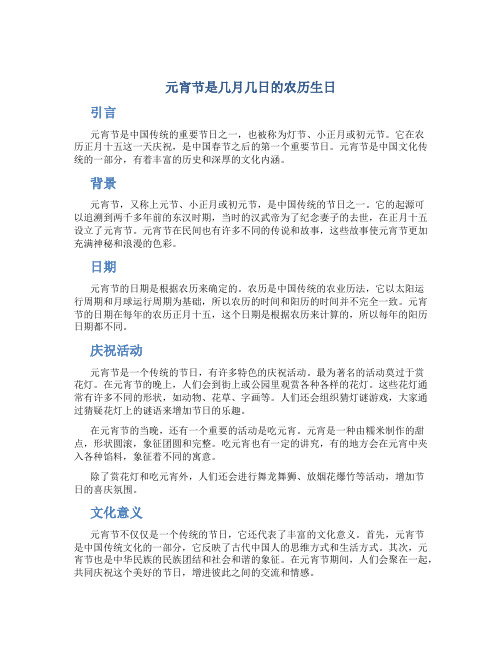
元宵节是几月几日的农历生日引言元宵节是中国传统的重要节日之一,也被称为灯节、小正月或初元节。
它在农历正月十五这一天庆祝,是中国春节之后的第一个重要节日。
元宵节是中国文化传统的一部分,有着丰富的历史和深厚的文化内涵。
背景元宵节,又称上元节、小正月或初元节,是中国传统的节日之一。
它的起源可以追溯到两千多年前的东汉时期,当时的汉武帝为了纪念妻子的去世,在正月十五设立了元宵节。
元宵节在民间也有许多不同的传说和故事,这些故事使元宵节更加充满神秘和浪漫的色彩。
日期元宵节的日期是根据农历来确定的。
农历是中国传统的农业历法,它以太阳运行周期和月球运行周期为基础,所以农历的时间和阳历的时间并不完全一致。
元宵节的日期在每年的农历正月十五,这个日期是根据农历来计算的,所以每年的阳历日期都不同。
庆祝活动元宵节是一个传统的节日,有许多特色的庆祝活动。
最为著名的活动莫过于赏花灯。
在元宵节的晚上,人们会到街上或公园里观赏各种各样的花灯。
这些花灯通常有许多不同的形状,如动物、花草、字画等。
人们还会组织猜灯谜游戏,大家通过猜疑花灯上的谜语来增加节日的乐趣。
在元宵节的当晚,还有一个重要的活动是吃元宵。
元宵是一种由糯米制作的甜点,形状圆滚,象征团圆和完整。
吃元宵也有一定的讲究,有的地方会在元宵中夹入各种馅料,象征着不同的寓意。
除了赏花灯和吃元宵外,人们还会进行舞龙舞狮、放烟花爆竹等活动,增加节日的喜庆氛围。
文化意义元宵节不仅仅是一个传统的节日,它还代表了丰富的文化意义。
首先,元宵节是中国传统文化的一部分,它反映了古代中国人的思维方式和生活方式。
其次,元宵节也是中华民族的民族团结和社会和谐的象征。
在元宵节期间,人们会聚在一起,共同庆祝这个美好的节日,增进彼此之间的交流和情感。
此外,元宵节还象征着春天的到来和万物复苏。
元宵节是农历新年之后的第一个节日,代表着寒冬的结束和春天的开始。
人们通过元宵节的庆祝活动,寄托对美好未来的向往和期待。
结论元宵节是中国传统文化中一个重要的节日,它在农历正月十五庆祝。
元宵节是几几日
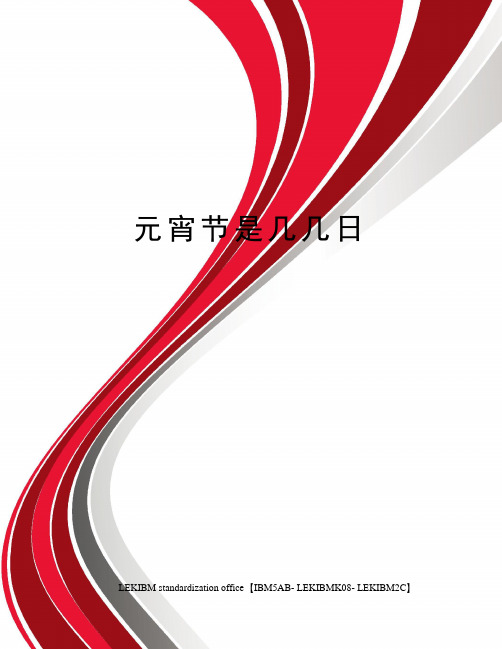
元宵节是几几日LEKIBM standardization office【IBM5AB- LEKIBMK08- LEKIBM2C】2013元宵节是几月几日元宵节是哪天什么时候?每年农历的正月十五日,春节刚过,迎来的就是中国的传统节日——元宵节,2013年的元宵节是:2013年2月24日。
元宵节简介:正月是农历的元月,古人称夜为“宵”,所以称正月十五为元宵节。
正月十五日是一年中第一个月圆之夜,也是一元复始,大地回春的夜晚,人们对此加以庆祝,也是庆贺新春的延续。
元宵节又称为“上元节”。
按中国民间的传统,在这天上皓月高悬的夜晚,人们要点起彩灯万盏,以示庆贺。
出门赏月、燃灯放焰、喜猜灯谜、共吃元宵,合家团聚、同庆佳节,其乐融融。
元宵节也称灯节,元宵燃灯的风俗起自汉朝,到了唐代,赏灯活动更加兴盛,皇宫里、街道上处处挂灯,还要建立高大的灯轮、灯楼和灯树,唐朝大诗人卢照邻曾在《十五夜观灯》中这样描述元宵节燃灯的盛况“接汉疑星落,依楼似月悬。
”宋代更重视元宵节,赏灯活动更加热闹,赏灯活动要进行5天,灯的样式也更丰富。
明代要连续赏灯10天,这是中国最长的灯节了。
清代赏灯活动虽然只有3天,但是赏灯活动规模很大,盛况空前,除燃灯之外,还放烟花助兴。
“猜灯谜”又叫“打灯谜”,是元宵节后增的一项活动,出现在宋朝。
南宋时,首都临安每逢元宵节时制迷,猜谜的人众多。
开始时是好事者把谜语写在纸条上,贴在五光十色的彩灯上供人猜。
因为谜语能启迪智慧又饶有兴趣,所以流传过程中深受社会各阶层的欢迎。
民间过元宵节吃元宵的习俗。
元宵由糯米制成,或实心,或带馅。
馅有豆沙、白糖、山楂、各类果料等,食用时煮、煎、蒸、炸皆可。
起初,人们把这种食物叫“浮圆子”,后来又叫“汤团”或“汤圆”,这些名称“团圆”字音相近,取团圆之意,象征全家人团团圆圆,和睦幸福,人们也以此怀念离别的亲人,寄托了对未来生活的美好愿望。
一些地方的元宵节还有“走百病”的习俗,又称“烤百病”“散百病”,参与者多为妇女,他们结伴而行或走墙边,或过桥,走郊外,目的是驱病除灾。
每年农历的正月十五日
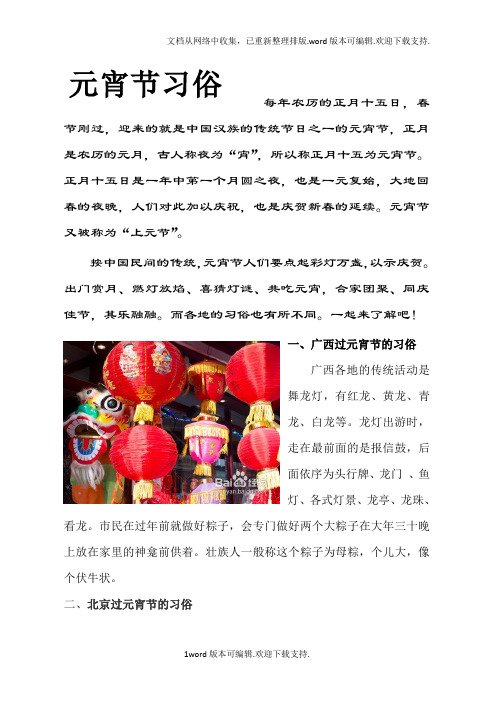
元宵节习俗每年农历的正月十五日,春节刚过,迎来的就是中国汉族的传统节日之一的元宵节,正月是农历的元月,古人称夜为“宵”,所以称正月十五为元宵节。
正月十五日是一年中第一个月圆之夜,也是一元复始,大地回春的夜晚,人们对此加以庆祝,也是庆贺新春的延续。
元宵节又被称为“上元节”。
按中国民间的传统,元宵节人们要点起彩灯万盏,以示庆贺。
出门赏月、燃灯放焰、喜猜灯谜、共吃元宵,合家团聚、同庆佳节,其乐融融。
而各地的习俗也有所不同。
一起来了解吧!一、广西过元宵节的习俗广西各地的传统活动是舞龙灯,有红龙、黄龙、青龙、白龙等。
龙灯出游时,走在最前面的是报信鼓,后面依序为头行牌、龙门、鱼灯、各式灯景、龙亭、龙珠、看龙。
市民在过年前就做好粽子,会专门做好两个大粽子在大年三十晚上放在家里的神龛前供着。
壮族人一般称这个粽子为母粽,个儿大,像个伏牛状。
二、北京过元宵节的习俗老北京最热闹的节日不是春节,而是元宵节。
从农历正月十三到正月十七,北京的老百姓要整整娱乐五昼夜。
老北京的元宵节,最重要的活动是赏灯。
明代北京的灯市在东城灯市口,元宵夜,街道两旁列市,上至珠宝玉器,下至日用百货,一应俱全,各铺户俱张挂绢纱、烧珠、明角、麦秸、通草制成的各式花灯,供人观赏。
到了清代,灯市遍布整个北京城。
三、湖北省过元宵节的习俗云梦县(今之江汉)老农夫於元宵夜持火炬偏照田圃,叫“照绝地蚕”。
儿童则以田鼓迎神,以卜岁事。
武昌的“弄龙”要一连三天。
全村的男女老少都跟随龙灯到邻村赴宴,称为“龙换酒”。
四、湖南省过元宵节的习俗常德上元各家以椒为汤,加入韭菜儆果诸物款待客人,称为“时汤”。
新田县游完龙灯后,将龙灯付之一炬,称为“送灾”。
五、云南省过元宵节的习俗云龙县於元宵节前迎三崇神,沿街立棚祭祀。
弥勒州元宵后一日燃香於桥,投石水中,再取水洗眼,据说可以去疾病。
元宵节吃元宵,是全国各地的共同风俗。
这种食品最早出现在宋代,诗人姜白石在一首《咏元宵》的诗中写道:"贵客钩帘看御街,市中珍品一时来。
汉族正月十五的风俗
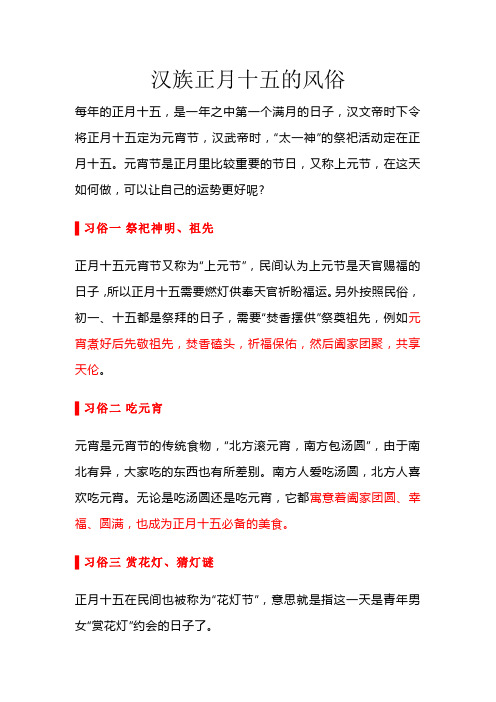
汉族正月十五的风俗每年的正月十五,是一年之中第一个满月的日子,汉文帝时下令将正月十五定为元宵节,汉武帝时,“太一神”的祭祀活动定在正月十五。
元宵节是正月里比较重要的节日,又称上元节,在这天如何做,可以让自己的运势更好呢?▌习俗一祭祀神明、祖先正月十五元宵节又称为“上元节”,民间认为上元节是天官赐福的日子,所以正月十五需要燃灯供奉天官祈盼福运。
另外按照民俗,初一、十五都是祭拜的日子,需要“焚香摆供”祭奠祖先,例如元宵煮好后先敬祖先,焚香磕头,祈福保佑,然后阖家团聚,共享天伦。
▌习俗二吃元宵元宵是元宵节的传统食物,“北方滚元宵,南方包汤圆”,由于南北有异,大家吃的东西也有所差别。
南方人爱吃汤圆,北方人喜欢吃元宵。
无论是吃汤圆还是吃元宵,它都寓意着阖家团圆、幸福、圆满,也成为正月十五必备的美食。
▌习俗三赏花灯、猜灯谜正月十五在民间也被称为“花灯节”,意思就是指这一天是青年男女“赏花灯”约会的日子了。
在古代江南才子才女们,会在这一天不约而同的聚集在街市上,互相以文会友,吟诗作赋,猜灯谜,赏花灯,品美食,看表演。
在娱乐的氛围中为自己寻找到“好姻缘”。
是中国民间传统的文化活动,其特色在于巧妙的利用汉字的意义和结构来设计谜语。
灯谜通常由一句话或一句诗句构成,答案通常与汉字或词语有关。
▌习俗四舞狮子舞狮,又称“狮子舞”、“狮灯”、“舞狮子”,舞狮子通常是一种大型的街头演出,多在年节和喜庆活动中表演。
在民间又有北狮和南狮之分,狮子在中国人心目中为瑞兽,象征着吉祥如意,从而在舞狮活动中寄托着民众消灾除害、求吉纳福的美好意愿。
▌习俗五放天灯这天,人们以放天灯的仪式来庆祝,所以又称天灯为“祈福灯”或“平安灯”。
其后逐渐演变为向上天祈福许愿的民俗活动。
天灯上写满了心里的各种祈愿,希望天灯能上达天庭,带给人无限的希望和光明。
▌习俗五走桥摸钉我国有几千年的文化历史,虽然不如外国人那样开放,但也是一个有属于自己浪漫的国家。
元宵节在古代就是“情人节”。
元宵节的由来与传说
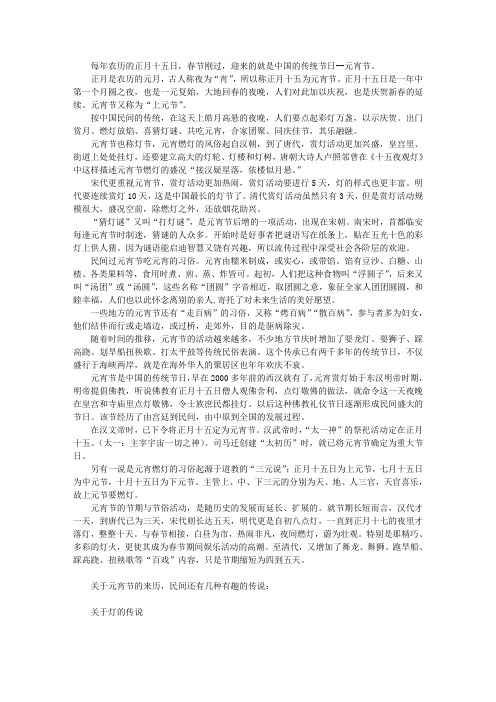
每年农历的正月十五日,春节刚过,迎来的就是中国的传统节日--元宵节。
正月是农历的元月,古人称夜为“宵”,所以称正月十五为元宵节。
正月十五日是一年中第一个月圆之夜,也是一元复始,大地回春的夜晚,人们对此加以庆祝,也是庆贺新春的延续。
元宵节又称为“上元节”。
按中国民间的传统,在这天上皓月高悬的夜晚,人们要点起彩灯万盏,以示庆贺。
出门赏月、燃灯放焰、喜猜灯谜、共吃元宵,合家团聚、同庆佳节,其乐融融。
元宵节也称灯节,元宵燃灯的风俗起自汉朝,到了唐代,赏灯活动更加兴盛,皇宫里、街道上处处挂灯,还要建立高大的灯轮、灯楼和灯树,唐朝大诗人卢照邻曾在《十五夜观灯》中这样描述元宵节燃灯的盛况“接汉疑星落,依楼似月悬。
”宋代更重视元宵节,赏灯活动更加热闹,赏灯活动要进行5天,灯的样式也更丰富。
明代要连续赏灯10天,这是中国最长的灯节了。
清代赏灯活动虽然只有3天,但是赏灯活动规模很大,盛况空前,除燃灯之外,还放烟花助兴。
“猜灯谜”又叫“打灯谜”,是元宵节后增的一项活动,出现在宋朝。
南宋时,首都临安每逢元宵节时制迷,猜谜的人众多。
开始时是好事者把谜语写在纸条上,贴在五光十色的彩灯上供人猜。
因为谜语能启迪智慧又饶有兴趣,所以流传过程中深受社会各阶层的欢迎。
民间过元宵节吃元宵的习俗。
元宵由糯米制成,或实心,或带馅。
馅有豆沙、白糖、山楂、各类果料等,食用时煮、煎、蒸、炸皆可。
起初,人们把这种食物叫“浮圆子”,后来又叫“汤团”或“汤圆”,这些名称“团圆”字音相近,取团圆之意,象征全家人团团圆圆,和睦幸福,人们也以此怀念离别的亲人,寄托了对未来生活的美好愿望。
一些地方的元宵节还有“走百病”的习俗,又称“烤百病”“散百病”,参与者多为妇女,他们结伴而行或走墙边,或过桥,走郊外,目的是驱病除灾。
随着时间的推移,元宵节的活动越来越多,不少地方节庆时增加了耍龙灯、耍狮子、踩高跷、划旱船扭秧歌、打太平鼓等传统民俗表演。
这个传承已有两千多年的传统节日,不仅盛行于海峡两岸,就是在海外华人的聚居区也年年欢庆不衰。
元宵节的由来
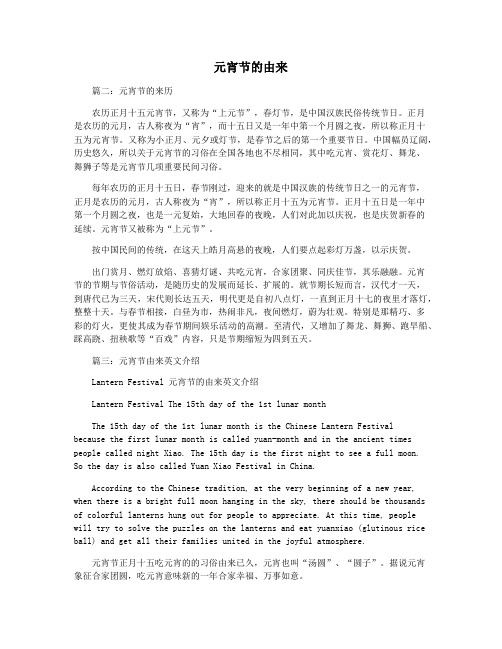
元宵节的由来篇二:元宵节的来历农历正月十五元宵节,又称为“上元节”,春灯节,是中国汉族民俗传统节日。
正月是农历的元月,古人称夜为“宵”,而十五日又是一年中第一个月圆之夜,所以称正月十五为元宵节。
又称为小正月、元夕或灯节,是春节之后的第一个重要节日。
中国幅员辽阔,历史悠久,所以关于元宵节的习俗在全国各地也不尽相同,其中吃元宵、赏花灯、舞龙、舞狮子等是元宵节几项重要民间习俗。
每年农历的正月十五日,春节刚过,迎来的就是中国汉族的传统节日之一的元宵节,正月是农历的元月,古人称夜为“宵”,所以称正月十五为元宵节。
正月十五日是一年中第一个月圆之夜,也是一元复始,大地回春的夜晚,人们对此加以庆祝,也是庆贺新春的延续。
元宵节又被称为“上元节”。
按中国民间的传统,在这天上皓月高悬的夜晚,人们要点起彩灯万盏,以示庆贺。
出门赏月、燃灯放焰、喜猜灯谜、共吃元宵,合家团聚、同庆佳节,其乐融融。
元宵节的节期与节俗活动,是随历史的发展而延长、扩展的。
就节期长短而言,汉代才一天,到唐代已为三天,宋代则长达五天,明代更是自初八点灯,一直到正月十七的夜里才落灯,整整十天。
与春节相接,白昼为市,热闹非凡,夜间燃灯,蔚为壮观。
特别是那精巧、多彩的灯火,更使其成为春节期间娱乐活动的高潮。
至清代,又增加了舞龙、舞狮、跑旱船、踩高跷、扭秧歌等“百戏”内容,只是节期缩短为四到五天。
篇三:元宵节由来英文介绍Lantern Festival 元宵节的由来英文介绍Lantern Festival The 15th day of the 1st lunar monthThe 15th day of the 1st lunar month is the Chinese Lantern Festival because the first lunar month is called yuan-month and in the ancient times people called night Xiao. The 15th day is the first night to see a full moon. So the day is also called Yuan Xiao Festival in China.According to the Chinese tradition, at the very beginning of a new year, when there is a bright full moon hanging in the sky, there should be thousands of colorful lanterns hung out for people to appreciate. At this time, peoplewill try to solve the puzzles on the lanterns and eat yuanxiao (glutinous rice ball) and get all their families united in the joyful atmosphere.元宵节正月十五吃元宵的的习俗由来已久,元宵也叫“汤圆”、“圆子”。
元宵节广播稿-精品

讲话稿/广播稿元宵节广播稿尊敬的各位顾客你们好,欢迎光临本店购物。
每年农历的正月十五日,春节刚过,迎来的就是中国的传统节日--元宵节。
正月是农历的元月,古人称夜为“宵”,所以称正月十五为元宵节。
正月十五日是一年中第一个月圆之夜,也是一元复始,大地回春的夜晚,人们对此加以庆祝,也是庆贺新春的延续。
元宵节又称为“上元节”。
按中国民间的传统,在这天上皓月高悬的夜晚,人们要点起彩灯万盏,以示庆贺。
出门赏月、燃灯放焰、喜猜灯谜、共吃元宵,合家团聚、同庆佳节,其乐融融。
元宵节也称灯节,元宵燃灯的风俗起自汉朝,到了唐代,赏灯活动更加兴盛,皇宫里、街道上处处挂灯,还要建立高大的灯轮、灯楼和灯树,唐朝大诗人卢照邻曾在《十五夜观灯》中这样描述元宵节燃灯的盛况“接汉疑星落,依楼似月悬。
”宋代更重视元宵节,赏灯活动更加热闹,赏灯活动要进行5天,灯的样式也更丰富。
明代要连续赏灯10天,这是中国最长的灯节了。
清代赏灯活动虽然只有3天,但是赏灯活动规模很大,盛况空前,除燃灯之外,还放烟花助兴。
“猜灯谜”又叫“打灯谜”,是元宵节后增的一项活动,出现在宋朝。
南宋时,首都临安每逢元宵节时制迷,猜谜的人众多。
开始时是好事者把谜语写在纸条上,贴在五光十色的彩灯上供人猜。
因为谜语能启迪智慧又饶有兴趣,所以流传过程中深受社会各阶层的欢迎。
民间过元宵节吃元宵的习俗。
元宵由糯米制成,或实心,或带馅。
馅有豆沙、白糖、山楂、各类果料等,食用时煮、煎、蒸、炸皆可。
起初,人们把这种食物叫“浮圆子”,后来又叫“汤团”或“汤圆”,这些名称“团圆”字音相近,取团圆之意,象征全家人团团圆圆,和睦幸福,人们也以此怀念离别的亲人,寄托了对未来生活的美好愿望。
一些地方的元宵节还有“走百脖的习俗,又称“烤百脖“散百脖,参与者多为妇女,他们结伴而行或走墙边,或过桥,走郊外,目的是驱病除灾。
随着时间的推移,元宵节的活动越来越多,不少地方节庆时增加了耍龙灯、耍狮子、踩高跷、划旱船扭秧歌、打太平鼓等传统民俗表演。
描写元宵节的作文(通用5篇)

描写元宵节的作文描写元宵节的作文(通用5篇)在日复一日的学习、工作或生活中,许多人都有过写作文的经历,对作文都不陌生吧,写作文是培养人们的观察力、联想力、想象力、思考力和记忆力的重要手段。
相信许多人会觉得作文很难写吧,下面是小编收集整理的描写元宵节的作文(通用5篇),仅供参考,希望能够帮助到大家。
描写元宵节的作文1每年农历的正月十五日,春节刚过,迎来的就是中国汉族的传统节日之一的元宵节,正月是农历的元月,古人称夜为“宵”,所以称正月十五为元宵节。
正月十五日是一年中第一个月圆之夜,也是一元复始,大地回春的夜晚,人们对此加以庆祝,也是庆贺新春的延续。
元宵节又被称为“上元节”。
今年的元宵节,很冷。
但是我和爸爸妈妈还是冒着严寒去看了挂在新悦广场附近的一些灯笼。
我看到了很多的灯笼,如:荷花美丽的荷花灯笼,也有我们家喻户晓的普通灯笼,还有一些灯笼上画着精美的龙,它们神态各异,栩栩如生,给寒冷的夜景增加了一番风趣。
回到家,妈妈煮了一锅热腾腾的`汤圆,我经过仔细观察,发现它们好像白白胖胖的小孩子,在锅里玩耍嬉戏,经过了5、6分钟的烹煮,终于煮好了。
我迫不及待地拿起勺子,把一个汤圆轻轻的咬了一口,哇!是芝麻馅的,黑乎乎的芝麻从汤圆里留流了出来,我看了急忙把它喂在了嘴里,好甜啊!我又喝了一口汤,真是完美的结合!吃完了汤圆,我们看了元宵节晚会,晚会里开场就十分精彩,我印象最深的就是由李云迪、沙溢,李倩、张傲月表演的创意节目《彩云追月》了。
看完了晚会,我便看着玉盘似的月亮,进入了梦乡……这个难忘元宵节,会永远的在我脑海中流荡!描写元宵节的作文2今天是元宵节,学校特别为我们准备元宵作为早饭。
老远的,我们就看见盘里的元宵,眉开眼笑地奔向饭桌。
旁边的同学急忙抓起勺子,“贪婪”地往碗里舀了多个,刚准备放下勺子,又停住了,小声地说:“哎呀,还是再添一个吧。
”我接过勺子,望了望盆里所剩不多的元宵,又望了望周围还空着碗的同学,眼睛重重地闭了一下,狠下心只舀了五个。
古代人元宵节当天有哪些活动
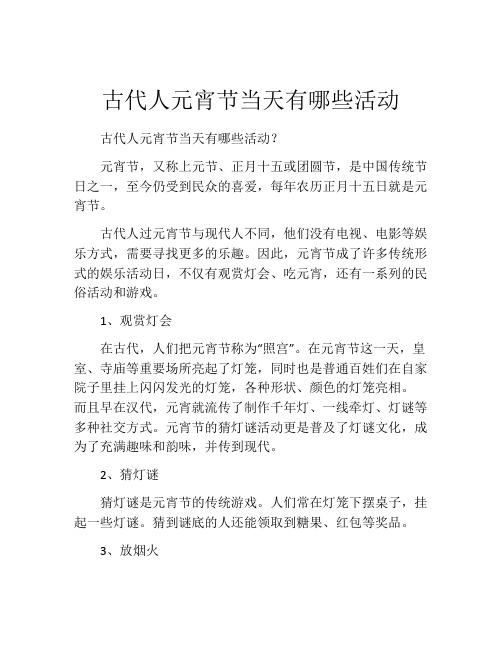
古代人元宵节当天有哪些活动古代人元宵节当天有哪些活动?元宵节,又称上元节、正月十五或团圆节,是中国传统节日之一,至今仍受到民众的喜爱,每年农历正月十五日就是元宵节。
古代人过元宵节与现代人不同,他们没有电视、电影等娱乐方式,需要寻找更多的乐趣。
因此,元宵节成了许多传统形式的娱乐活动日,不仅有观赏灯会、吃元宵,还有一系列的民俗活动和游戏。
1、观赏灯会在古代,人们把元宵节称为“照宫”。
在元宵节这一天,皇室、寺庙等重要场所亮起了灯笼,同时也是普通百姓们在自家院子里挂上闪闪发光的灯笼,各种形状、颜色的灯笼亮相。
而且早在汉代,元宵就流传了制作千年灯、一线牵灯、灯谜等多种社交方式。
元宵节的猜灯谜活动更是普及了灯谜文化,成为了充满趣味和韵味,并传到现代。
2、猜灯谜猜灯谜是元宵节的传统游戏。
人们常在灯笼下摆桌子,挂起一些灯谜。
猜到谜底的人还能领取到糖果、红包等奖品。
3、放烟火在古代时期,放烟花的习俗也被广泛地流传下来,中国古代人们会打鸟枪、放爆米花等烟花,庆祝团圆和节日,而且不仅在普通民间,在宫廷中也公开使用,且数量惊人。
这项活动已成为了中国的传统文化,烟花一直铺满了整个中国。
4、舞狮舞龙表演狮子制作和舞龙制作用于庆祝节日及重要活动,如祈雨祈丰年、庆祝年节等。
在古代中国,这种舞狮舞龙的活动非常盛行,有着非常高的文化价值,被视为祈祷与祈福的仪式。
现在找狮子舞者舞龙舞狮以庆祝节日以示吉祥和意义的仪式仍传承至今。
5、吃元宵在元宵节当天,人们还要品尝元宵,又叫汤圆,因为这天是团圆夜,阴历十五日,最是阖家欢聚的日子。
我们需要普及吃汤圆的原因。
元宵最初是寒食节的重要食品,寓意着人们向古代爱国诗人屈原表达怀念之情。
总之,古代人过元宵节时有很多特别的活动,这些活动每一个都有着独特的含义和寓意,让人们在欢乐的同时感受到传统文化的魅力,这些活动不仅让人欢度佳节,同时也传承了古代的文化传统。
中国传统节日上元节

中国传统节日上元节上元节,又称元宵节,是中国传统的重要节日之一。
每年农历正月十五日,人们会举办各种庆祝活动,特别是民间的元宵灯会,为节日增添了欢乐和热闹的气氛。
本文将介绍上元节的由来、庆祝方式以及传统习俗。
一、由来上元节起源于中国古代的汉民族,据史书记载,上元节最早可以追溯到东汉时期。
那时候,人们相信正月十五是一年中最重要的日子,是天地岁首的时刻,也是祭祀神灵的大日子。
据说,正月十五是上天派下九天玄女仙下凡救火的日子,因此形成了人们庆祝上元节的传统习俗。
二、庆祝方式1. 元宵灯会元宵灯会是上元节最引人注目的庆祝方式之一。
在这一天,人们会提前精心准备各式各样的灯笼,包括红灯笼、花灯等,然后挂在街道、庭院或公园里。
夜晚时分,灯会正式开始,无数的灯笼点亮了整个城市,把夜晚装点得五彩斑斓。
人们结伴而行,欣赏灯会的壮观景象,同时也品尝着特制的元宵。
2. 舞狮舞龙舞狮舞龙也是上元节常见的庆祝方式。
传统的舞狮舞龙表演通常在街头广场上进行。
人们会准备一条长龙舞蹈和一只巨大的狮子舞蹈,表演者身披华丽的服饰,手拿长竹竿,用巧妙的动作和舞蹈展现出狮子的灵动和力量。
观众们则簇拥在周围,全情投入地观看和欣赏这场表演盛宴。
3. 猜灯谜上元节期间,许多地方还举办猜灯谜的活动。
人们会把灯谜写在红纸上,然后挂在灯笼上,供参与者猜解。
猜谜者需要凭借智慧和想象力来解开谜底。
猜灯谜既考验参与者的才智,也增添了节日的趣味性。
三、传统习俗1. 吃元宵元宵是上元节必不可少的传统食品。
它由糯米制成,通常包含多种馅料,如花生、豆沙、红枣等。
元宵在北方也叫做汤圆,取寓意团团圆圆,家人团聚的美好寓意。
家庭成员会围坐在一起,共同享用元宵,象征着家庭幸福和团圆。
2. 玩花灯除了观赏花灯,人们还会亲自制作一些小型花灯来玩耍。
孩子们尤其喜欢玩弄小灯笼,他们会将小灯笼挂在树上或玩具上,然后一边欢笑玩耍,一边观赏美丽的灯光。
3. 祭祀祖先上元节也是祭祀祖先的传统时刻。
元宵节介绍PPT课件

节日介绍
元宵节,又称上元节、小正月、元夕或灯节,为每年农历 正月十五日,是中国的传统节日之一。正月是农历的元月, 古人称“夜”为“宵”,正月十五日是一年中第一个月圆之夜, 所以称正月十五为“元宵节”。
根据道教“三元”的说法,正月十五日又称为“上元节”。元宵 节习俗自古以来就以热烈喜庆的观灯习俗为主。
这样,正月十五日就被称为上元节。南宋吴自牧 在《梦粱录》中说:“正月十五日元夕节,乃上元 天官赐福之辰。”故上元节要燃灯。
第四章
社会影响
click here to enter text descriptions such as content introduction, data statistics, event analysis, summary and overview related to this subtitle or graph.
节日介绍
不过,正月十五元宵节真正作为民俗节日是在汉魏之后。 正月十五燃灯的习俗与佛教东传有关。唐朝时,佛教大兴, 仕官百姓普遍在正月十五这一天“燃灯供佛”,佛家灯火于 是遍布民间。从唐代起,元宵张灯即成为法定之事,并逐 渐成为民间习俗。
节日介绍
元宵节是中国与汉字文化圈 地区以及海外华人的传统节 日之一。 元宵节主要有赏花灯、吃汤 圆、猜灯谜、放烟花等一系 列传统民俗活动。
节日PPT模板 /jieri/
此外,不少地方元宵节还增 加了耍龙灯、耍狮子、踩高 跷、划旱船、扭秧歌、打太 平鼓等传统民俗表演。
每年农历的正月十五日
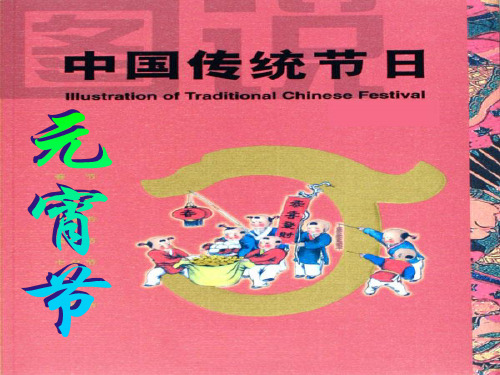
吃元宵 “元宵”作为食品,在我国也由来已久。
宋代,民间即流行一种元宵节吃 的新奇食 品。这种食品,最早叫“ 浮元子”后称 “元宵” ,生意人还美其名曰 “元宝” 。 古时“元宵”价格比较贵,有一首诗说: “贵客钩帘看御街,市中珍品一时来。帘 前花架无路行,不得金钱不得回。”
正月十五吃元宵,元宵即 “汤圆”以白糖、玫瑰、芝麻、 豆沙、黄桂、核桃仁、果仁、 枣泥等为馅,用糯米粉包成圆 形,可荤可素,风味各异。可 汤煮、油炸、蒸食,有团圆美 满之意。陕西的汤圆不是包的, 而是在糯米粉中"滚"成的,或 煮司 或油炸,热热火火,团 团圆圆。
清代诗人姚元之写的《咏元宵节》:“花间蜂蝶趁喜狂,宝马香车夜正长。十 二楼前灯似火,四平街外月如霜。”更是生动、精彩别致。
, ……
天一远中 步方国 一走的 步来传 走元统 到宵节 了节日 今也从
传统社会的元宵节是城乡重视的民俗大节,在城市元宵喧闹尤为热烈,它体 现了中国民众特有的狂欢精神。传统元宵所承载的节俗功能已被日常生活消解, 人们逐渐失去了共同的精神兴趣,复杂的节俗已经简化为“吃元宵”的食俗。
猜灯谜 “猜灯谜”又叫“打灯谜”, 是元宵节后增的一项活动,出 现在宋朝。南宋时,首都临安 每逢元宵节时制迷,猜谜的人 众多。开始时是好事者把谜语 写在纸条上,贴在五光十色的 彩灯上供人猜。因为谜语能启 迪智慧又饶有兴趣,所以流传 过程中深受社会各阶层的欢迎。
走百病 元宵节除了
庆祝活动外,还有 信仰性的活动。那 就是“走百病”又 称“烤百病”“散 百病”参与者多为 妇女,他们结伴而 行或走墙边,或过 桥过走郊外,目的 是驱病除灾。
看看今天的情况吧:
重阳节 端午节
春节 清明节
华夏传统节日是华夏民族历史文化长河所积淀的 产物,它们承载着丰富而深厚的伦理文化意味。 但是,伴随欧风美雨的影响和现代都市生活的发 展,都市青年人往往对自身的传统节日丧失应有 的温情与敬意,却对过洋节乐此不疲。中国的传 统节日面临着西方节日的挑战。
元宵节的传说30字
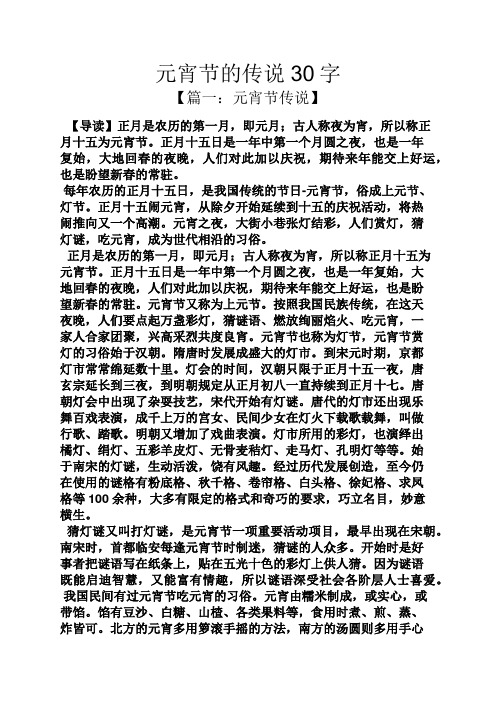
元宵节的传说30字【篇一:元宵节传说】【导读】正月是农历的第一月,即元月;古人称夜为宵,所以称正月十五为元宵节。
正月十五日是一年中第一个月圆之夜,也是一年复始,大地回春的夜晚,人们对此加以庆祝,期待来年能交上好运,也是盼望新春的常驻。
每年农历的正月十五日,是我国传统的节日-元宵节,俗成上元节、灯节。
正月十五闹元宵,从除夕开始延续到十五的庆祝活动,将热闹推向又一个高潮。
元宵之夜,大街小巷张灯结彩,人们赏灯,猜灯谜,吃元宵,成为世代相沿的习俗。
正月是农历的第一月,即元月;古人称夜为宵,所以称正月十五为元宵节。
正月十五日是一年中第一个月圆之夜,也是一年复始,大地回春的夜晚,人们对此加以庆祝,期待来年能交上好运,也是盼望新春的常驻。
元宵节又称为上元节。
按照我国民族传统,在这天夜晚,人们要点起万盏彩灯,猜谜语、燃放绚丽焰火、吃元宵,一家人合家团聚,兴高采烈共度良宵。
元宵节也称为灯节,元宵节赏灯的习俗始于汉朝。
隋唐时发展成盛大的灯市。
到宋元时期,京都灯市常常绵延数十里。
灯会的时间,汉朝只限于正月十五一夜,唐玄宗延长到三夜,到明朝规定从正月初八一直持续到正月十七。
唐朝灯会中出现了杂耍技艺,宋代开始有灯谜。
唐代的灯市还出现乐舞百戏表演,成千上万的宫女、民间少女在灯火下载歌载舞,叫做行歌、踏歌。
明朝又增加了戏曲表演。
灯市所用的彩灯,也演绎出橘灯、绢灯、五彩羊皮灯、无骨麦秸灯、走马灯、孔明灯等等。
始于南宋的灯谜,生动活泼,饶有风趣。
经过历代发展创造,至今仍在使用的谜格有粉底格、秋千格、卷帘格、白头格、徐妃格、求凤格等100余种,大多有限定的格式和奇巧的要求,巧立名目,妙意横生。
猜灯谜又叫打灯谜,是元宵节一项重要活动项目,最早出现在宋朝。
南宋时,首都临安每逢元宵节时制迷,猜谜的人众多。
开始时是好事者把谜语写在纸条上,贴在五光十色的彩灯上供人猜。
因为谜语既能启迪智慧,又能富有情趣,所以谜语深受社会各阶层人士喜爱。
我国民间有过元宵节吃元宵的习俗。
- 1、下载文档前请自行甄别文档内容的完整性,平台不提供额外的编辑、内容补充、找答案等附加服务。
- 2、"仅部分预览"的文档,不可在线预览部分如存在完整性等问题,可反馈申请退款(可完整预览的文档不适用该条件!)。
- 3、如文档侵犯您的权益,请联系客服反馈,我们会尽快为您处理(人工客服工作时间:9:00-18:30)。
每年农历的正月十五日,迎来的是中国的传统节日——元宵节。
元宵节主要的活动就是看灯。
汉朝时期,佛教盛行。
明帝听说佛教有正月十五日僧人观佛舍利点灯敬佛的做法,就命令这一天夜晚在皇宫和寺庙里点灯敬佛。
以后这种佛教礼仪逐渐形成民间盛大的节日。
各式各样美丽的花灯在这一天都会被悬挂,从而吸引了无数游客。
猜灯谜也是元宵节的一项重要活动,花灯的主人会将谜面写在纸上,然后贴在灯笼上,将灯笼挂在门口。
如果有人可以猜中,就能得到小小的礼物。
【翻译词汇】看灯watching lanterns 汉朝the Han Dynasty 佛教Buddhism 明帝Emperor Ming 敬佛worship Buddha 皇宫imperial palace 礼仪ritual盛大的grand 无数的countless 猜灯谜Guessing lantern riddles 贴paste 【精彩译文】The Lantern Festival falls on the 15th day of the 1st lunar month. Watching lanterns is this day’s important activity. Throughout the Han Dynasty, Buddhism flourished in China. Emperor Ming heard that Buddhist monks would watch sarira and light lanterns to worship Buddha on the 15th day of the 1st lunar month. Therefore, he commanded to light lanterns in the imperial palace and temples to show respect to Buddha on this day. Later, the Buddhist ritual developed into a grand festival among common people. Lanterns of various shapes and sizes are hung in the streets, attracting countless visitors. "Guessing lantern riddles" is an essential part of the Festival. Lantern owners write riddles on pieces of paper and paste them on the lanterns. If visitors have got solutions to the riddles, they will obtain a little gift.中华民族的传统文化博大精深、源远流长。
早在2 000多年前,就产生了儒家学说和道家学说,以及其他很多在中国思想史上有地位的学说流派,这就是有名的“诸子百家”。
从孔夫子到孙中山,中华民族传统文化有它的很多珍贵品质。
比如“天下兴亡,匹夫有责”的爱国情操,“民为邦本”、“民贵君轻”的民本思想和“己所不欲,勿施于人”的行为准则。
【翻译词汇】博大精深both extensive and profound儒家学说Confucianism道家学说Taoism诸子百家Hundred Schools of Thought孔夫子Confucius孙中山Dr. Sun Yat-sen天下兴亡,匹夫有责Everybody is responsible for the rise or fall of the country.爱国情操patriotism民为邦本People are the foundation of the country.民贵君轻The people are more important than the monarch.己所不欲,勿施于人Don’t do to others what you don’t want others to do to you.行为准侧code of conduct【精彩译文】The traditional Chinese culture, both extensive and profound, starts far back and runs a long, long course. More than 2 000 years ago, there emerged in China Confucianism and Taoism, and many other theories and doctrines that figured prominently in the history of Chinese thought, all being covered by the famous term “the Hundred Schools of Thought”. From Confucius to Dr. Sun Yat-sen, the traditional Chinese culture presents many precious ideas. For example, they lay stress on. patriotism as embodied in the saying “Everybody is responsible for the rise or fall of the country.”, the populist ideas that “People are the foundation of the country.”and that “The people are more important than the monarch”and the code of conduct of“Don’t do to others what you don’t want others to do to you”.中国新年是中国最重要的传统节日,在中国也被称为春节。
新年的庆祝活动从除夕开始一直延续到元宵节,即从农历最后一个月的最后一天至新年第一个月的第十五天。
各地欢度春节的习俗和传统有很大差异,但通常每个家庭都会在除夕夜团聚,一起吃年夜饭。
为驱厄运、迎好运,家家户户都会进行大扫除。
人们还会在门上粘贴红色的对联,对联的主题为健康、发财和好运。
其他的活动还有放鞭炮、发红包和探访亲友等。
【翻译词汇】中国新年Chinese New Year春节the Spring Festival除夕Chinese New Year’s Eve元宵节the Lantern Festival农历lunar calendar有差异vary年夜饭annual reunion dinner驱厄运sweep away ill fortune迎好运bring in good luck大扫除thoroughly clean the house对联couplets放鞭炮light firecrackers发红包give money in red envelopes【精彩译文】Chinese New Year is the most important traditional Chinese festival. In China, it is also known as the Spring Festival. New Year celebrations run from Chinese New Year’s Eve, the last day of the last month of the lunar calendar, to the Lantern Festival on the 15th day of the first month. Customs and traditions concerning the celebration of the Chinese New Year vary widely from place to place. However, New Year’s Eve is usually an occasion for Chinese families to gather for the annual reunion dinner. It is also traditional for every family to thoroughly clean the house in order to sweep away ill fortune and to bring in good luck. And doors will be decorated with red couplets withthemes of health, wealth and good luck. Other activities include lighting firecrackers,giving money in red envelopes, and visiting relatives and friends.几千年的中国文化充实着中国梦,同时,过去三十几年的改革开放也激励着中国梦。
中国梦最显著的特征是包容性和双赢合作。
这些也是使中国梦扩大它的全球影响范围和被其他国家的人民认可的基本特征。
中国梦是民族复兴的梦。
它是建设一个强大繁荣的国家,给中国人民带来幸福生活的梦。
中国梦需要维持稳定健康的经济发展,科学管理社会,以及有效应对外部发展的风险和挑战。
【翻译词汇】中国梦the Chinese dream 改革开放reform and opening-up激励inspire 包容性inclusiveness 双赢合作win-win cooperation扩大expand 民族复兴national rejuvenation 强大(的)powerful繁荣的prosperous 需要entail 稳定健康的steady and healthy应对respond to 外部发展external development 风险risk 挑战challenge 【精彩译文】The Chinese dream has been enriched by thousands of years of Chinese culture and inspired among other things by the past three decades of reform and opening-up. The most noticeable features of the Chinese dream include inclusiveness and win-win cooperation. These are the very features that will enable the Chinese dream to expand its global reach and be recognized by people of other nations. The Chinese dream is the dream of national rejuvenation. It is the dream of building a powerful and prosperous state, a dream of bringing happiness in the lives of the Chinese people. It entails sustaining steady and healthy economic growth, scientifically managing the Chinesesociety, and effectively responding to the risks and challenges of external development. 随着中国经济迅速发展到新的高度,中国目前已经进入了大规模消费时代,中国民众的购买力随着中国市场经济的发展而迅速增长。
